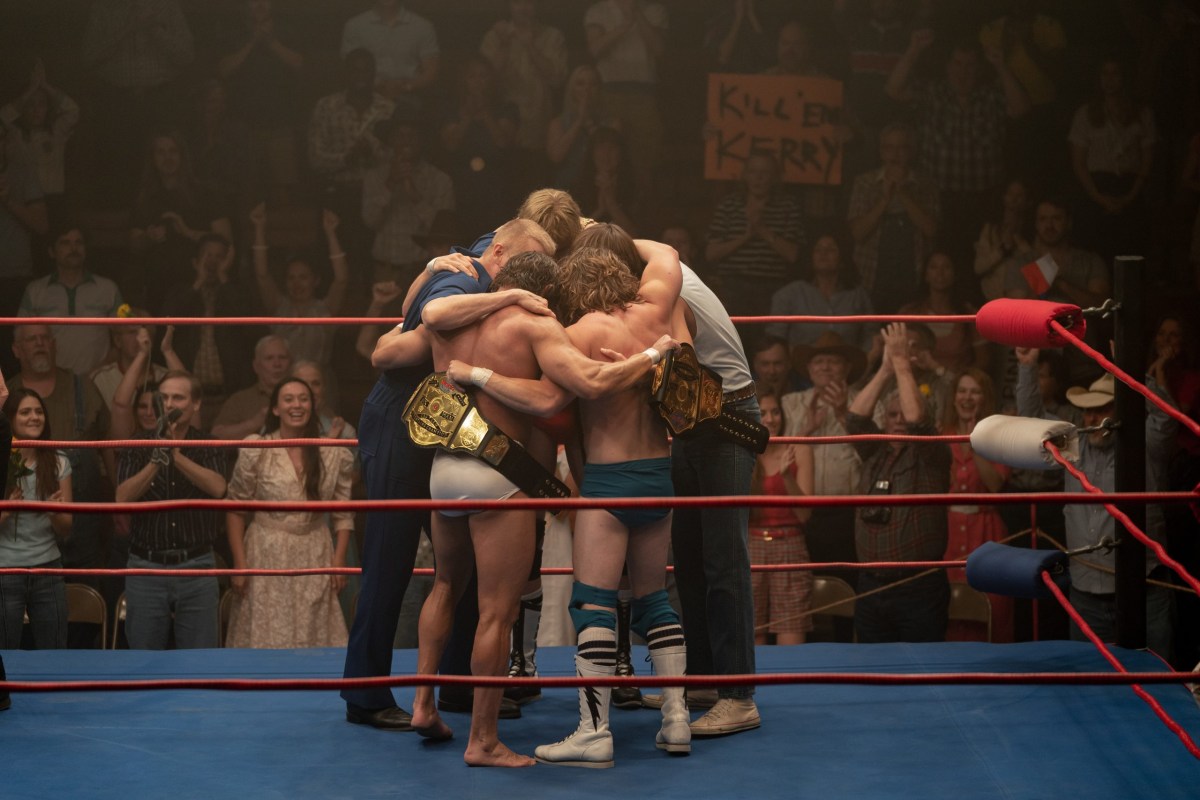Four decades ago, the American director Robert Aldrich made the most cheerful, companionable, and charitable movie ever produced about professional wrestling. Against all expectations, Aldrich—the grand master of the grotesque on the basis of such cartoonishly misanthropic masterpieces as Kiss Me Deadly, What Ever Happened to Baby Jane? and The Legend of Lylah Clare—found the kinder side of his personality in …All the Marbles, centered on a fictitious female wrestling duo, the California Dolls, played winsomely by Vicki Frederick and Laurene Landon. Sure there’s plenty of thrashing in the ring, but in Aldrich’s conception, the Dolls are admirable, even virtuous, for their spirit and pluck: the pride they take in performing and the strength they show in talking back to their parsimonious promoter (Peter Falk). For Aldrich, professional wrestlers are contemporary descendants of troubadours, circus performers, and clowns—not unlike the woebegone clown Calvero in Chaplin’s classic Limelight (a film on which Aldrich served as assistant director). In its insistence on the humanity of characters among such tawdry environs, …All the Marbles is more deserving of praise than many films on more obviously respectable subjects.
Now we have a second admirable film on the inner lives of those who earn their keep through the benighted art of professional pummeling. Writer-director Sean Durkin’s The Iron Claw is about the real-life Von Erich family of wrestlers, but it shares with Aldrich’s earlier, more poetic film a gentleness of spirit that is utterly beguiling. Both films serve as reminders that even those who seem to embody the worst excesses of American popular culture have souls, notions of self-worth, and standards to which they hold themselves.
Like the Kennedy family, to whom they are often compared, the Von Erichs seem to have been jostled by fate. In the film, patriarch Fritz (Holt McCallany) has responded to the ups and downs in his own wrestling career by imploring his young family to become tougher, stronger, and meaner, and above all to pursue wrestling as though it were a religion, a higher calling, a way of life. His wife Doris (Maura Tierney) is warmer and more realistic, but their four surviving sons—Kevin (Zac Efron), David (Harris Dickinson), Kerry (Jeremy Allen White), and Mike (Stanley Simons)—have no choice but to adopt, to one degree or another, this punishing stoic ethos. The boys share their father’s obsession with overcoming, through sheer brawn, what he regards as the unfairness and injustices of the world—a view somewhat validated by the death of his oldest son in childhood but which the family, peculiarly, openly regards as a “curse.”
In Durkin’s telling, though, Fritz’s relentless drive isn’t all bad. It’s beyond question that Fritz has developed a thriving business in World Class Championship Wrestling, the banner under which Kevin and David wrestle. His ambition has earned his family a comfortable lifestyle in 1980s-era Dallas; among the many period details this well-designed film gets right is the look and feel of suburban ranch houses with concrete driveways on hot, hopeful summer days. And at the outset, all the boys seem amiable and well-adjusted: Kevin is happy to cede the spotlight to the more talkative David, and Mike doesn’t mind that he risks losing his father’s favor with his musical ambitions. Doris prepares great heaps of fried southern food for the brood to consume, or inhale. A poster of Smokey and the Bandit hangs over the bed in Kevin’s room, which he shares with David.
Once in the ring, the wrestling scenes are true to the hyped-up artifice inherent in the sport: the participants strut around, fling, hurl, and propel themselves at their opponent, and draw out the much-anticipated delivery of signature wrestling moves (which, in the case of the Von Erich family, is the so-called “iron claw,” a kind of grasping at an opponent’s face using the entirety of one’s hand). It’s not surprising that there is, in our times, some overlap between wrestling fans and Trump voters; both are invested in a kind of wink-wink spectacle that is no less engrossing for being somewhat counterfeit. In the movie, the acquisition of wrestling titles and belts seems to be more a matter of scheduling and audience demand than actual athletic accomplishment, but one need only look at the muscle-bound Efron—a long way from his days as a teen idol—to see that success in the ring requires diligence in the weight room, too.
The film seems to be merely marking time from one big match to the next—notable opponents include the flabby, entirely unthreatening Harley Race (Kevin Anton) and the silly, screaming Ric Flair (Aaron Dean Eisenberg)—but then a series of calamities befall the Von Erichs. David succumbs to a fluke intestinal condition while competing in Japan; Kerry suffers the loss of a foot following a motorcycle accident and comes to depend on a prosthesis in the ring; Mike enters a coma while having shoulder surgery and is never the same again. The family strives to hold on to what remains, but the “curse” that was spoken of early in the film takes on real gravity. (Is it a coincidence that the title of the film, The Iron Claw, so closely resembles the story “The Monkey’s Paw”?)
Yet Durkin trips up in this stretch of the story: the filmmaker desperately wants the lesson of the movie to be that Fritz’s insistence on wrestling as a way of life proved ruinous to his family, but none of these tragedies was directly attributable to wrestling. Yes, David was overseas for a match when he took ill, but who is to say he would not have had he been in another line of work? Surely Mike would not have injured his shoulder unless he had been pressed into wrestling, but he was at no greater susceptibility of falling into a coma simply during surgery for having been in the ring. These tribulations are simply the stuff of life; bad things happen. If the Von Erichs erred, it was in placing Fritz—so commanding, so authoritative—in the godhead; his good intentions and work ethic could not overcome the designs of the universe, and his wife, a churchgoer, ought to have known that.
The Iron Claw redeems itself in its last section, which shows Kevin, by now married with children of his own, settling into a contented domestic existence. Without revealing the specific fates of his brothers, one lovely scene shows Kevin letting his mind drift to thoughts of what comes after death, and his vision is one of the most satisfying depictions of an afterlife in memory. It must be said that, throughout, Efron gives a subtle, restrained, entirely persuasive performance of a soul lost and found.
In the realm of sports movies, you can keep Rocky, The Natural, and even Chariots of Fire. As for me, I’ll gladly take …All the Marbles and The Iron Claw, two films that take the lowliest of purported sports and spin something elevated out of them.

